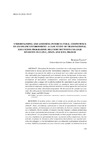Please use this identifier to cite or link to this item:
https://accedacris.ulpgc.es/jspui/handle/10553/45411
| Title: | Understanding and assessing intercultural competence in an online environment: A case study of transnational education programme delivery between college students in ULPGC, Spain, and ICES, France | Authors: | Clouet, Richard | UNESCO Clasification: | 57 Lingüística | Keywords: | Intercultural communication Communicative competence Transnational programmes Assessment Social justice, et al |
Issue Date: | 2013 | Publisher: | 0213-2028 | Journal: | Revista Espanola de Linguistica Aplicada | Abstract: | Throughout the literature, researchers use a wide range of more or less
related terms to discuss and describe ‘intercultural competence’. They have in common
the attempt to account for the ability to go beyond one’s own culture and interact with
other individuals from linguistically and culturally diverse backgrounds. In that sense,
contact with other languages and cultures provides an excellent opportunity to foster the
development of intercultural communicative competence and online transnational
programmes play a unique role in offering students the opportunity to put into practice
their intercultural competencies. In this article we summarize theory and research on
intercultural competence, paying particular attention to existing approaches and tools for
its assessment in online educational programmes. We also present the example of a case
study: the setting up of a transnational education programme between college students in
ULPGC, Spain, and ICES, France. El análisis teórico sobre el estado de la cuestión nos lleva al gran número de términos que usan los investigadores para referirse a la “competencia intercultural”. Todos, sin embargo, explican que se trata de la capacidad de ir más allá de su propia cultura y de interactuar con otros individuos de diversos contextos lingüísticos y culturales. En este sentido, el contacto con otras lenguas y culturas proporciona una excelente oportunidad para fomentar el desarrollo de la competencia comunicativa intercultural, y los programas transnacionales en línea juegan un papel único: ofrecen a los estudiantes la oportunidad de poner en práctica dicha competencia. En este artículo, resumimos la literatura sobre competencia intercultural, con especial atención a los enfoques y a las herramientas para su evaluación en programas educativos en línea. También presentamos un caso concreto como ejemplo: la elaboración de un programa educativo transnacional entre estudiantes de la ULPGC en España y de ICES en Francia. |
URI: | https://accedacris.ulpgc.es/handle/10553/45411 | ISSN: | 0213-2028 | Source: | Revista Espanola de Linguistica Aplicada[ISSN 0213-2028],v. 26, p. 139-158 |
| Appears in Collections: | Artículos |
SCOPUSTM
Citations
12
checked on Jun 8, 2025
WEB OF SCIENCETM
Citations
6
checked on Feb 25, 2024
Page view(s) 5
422
checked on Oct 31, 2024
Download(s)
241
checked on Oct 31, 2024
Google ScholarTM
Check
Share
Export metadata
Items in accedaCRIS are protected by copyright, with all rights reserved, unless otherwise indicated.
